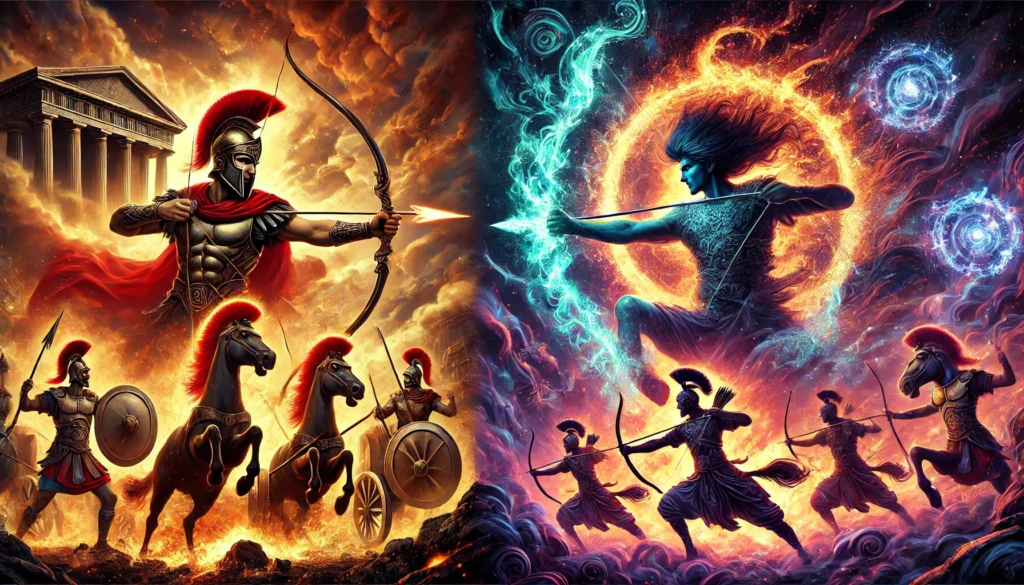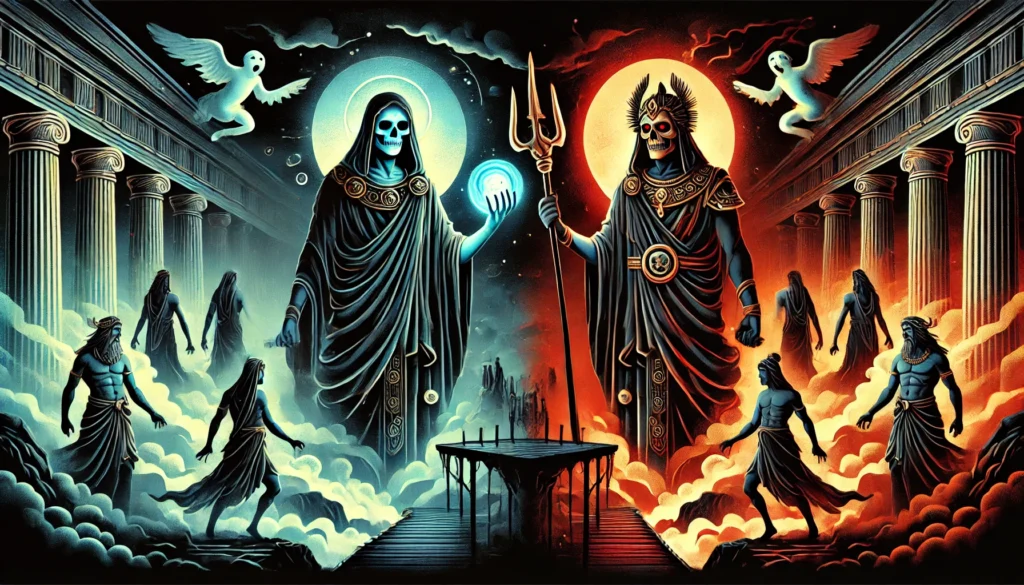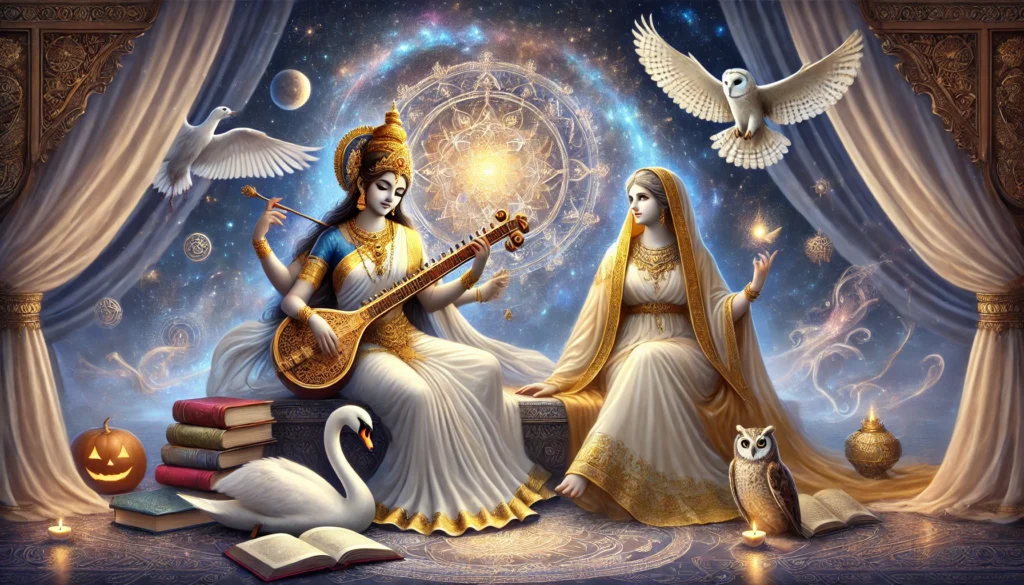Introduction
Did you know that Zeus and Indra share more than just their thrones of power? Across continents and centuries, Greek and Indian mythologies reveal fascinating parallels that connect two ancient civilizations. These stories, passed down through generations, are filled with gods, heroes, and epic battles that reflect the core values and struggles of humanity.
Greek and Indian mythologies have shaped the cultural, spiritual, and artistic frameworks of their respective societies. While Greece and India are geographically distant, their mythologies converge in surprising ways. From thunderbolt-wielding gods to tragic heroes and cosmic cycles, the similarities between these narratives are nothing short of mind-blowing.
This article delves into ten striking parallels between Greek and Indian mythology, exploring shared archetypes, themes, and lessons that continue to captivate and inspire.

Highlighting Similar Themes and Archetypes
1. Supreme Gods: Zeus and Indra
Both Zeus and Indra reign as rulers of the heavens, commanding thunder and lightning as symbols of their power. Zeus, the Greek king of gods, is depicted as a mighty yet temperamental deity, prone to indulgence and moral lapses. Similarly, Indra, the king of Devas in Indian mythology, is revered as a warrior and protector, though his flaws and impulsive decisions often land him in trouble.
Their stories highlight their dual roles as powerful leaders and fallible beings, embodying the complexities of divine kingship.
2. Heroic Warriors: Achilles and Karna
Achilles from the Iliad and Karna from the Mahabharata are heroic warriors with divine parentage and unmatched combat skills. Both characters grapple with questions of loyalty and destiny.
Achilles, the son of the sea goddess Thetis, is nearly invincible but meets a tragic end due to his vulnerability—his heel. Karna, born to the sun god Surya, is cursed with an equally tragic fate. His unwavering loyalty to Duryodhana and his ethical dilemmas mirror Achilles’ struggles in choosing between personal glory and moral duty.
3. Strongmen: Hercules and Bhima
Hercules, the son of Zeus, and Bhima, one of the Pandavas, are celebrated for their extraordinary strength and heroic exploits. Hercules’ Twelve Labors and Bhima’s feats during the Mahabharata war showcase their roles as protectors and avengers.
Despite their immense power, both characters face moral quandaries, symbolizing the importance of inner strength alongside physical prowess.
Narrative Similarities
4. Divine Lovers: Aphrodite and Rati
Aphrodite, the Greek goddess of love, and Rati, the consort of Kama in Indian mythology, personify beauty, passion, and the transformative power of love.
Both deities influence divine and mortal realms, shaping destinies through their charms and interventions. Their stories underscore the centrality of love in human and divine experiences.

5. Underworld Journeys: Hades and Yama
Hades, the Greek god of the underworld, and Yama, the Indian god of death, govern the realms of the dead and oversee moral judgments.
While Hades is often portrayed as a stoic ruler, Yama embodies a more dynamic role, balancing judgment with compassion. Both figures highlight the inevitability of death and the moral consequences of human actions.
6. Epic Narratives: Iliad and Mahabharata
The Iliad and the Mahabharata are monumental epics exploring themes of honor, betrayal, and destiny. The Iliad revolves around the Trojan War, while the Mahabharata chronicles the Kurukshetra War.
Both epics delve into the complexities of human relationships, ethical dilemmas, and the impact of war on societies. The parallels between Achilles and Arjuna or Hector and Bhishma further emphasize shared storytelling patterns.
Symbolism and Cross-Cultural Parallels
7. Cosmic Origins: Chaos and Brahman
The Greek concept of Chaos and the Indian notion of Brahman represent the primordial state preceding creation. Chaos is the formless void, while Brahman is the infinite, unchanging reality from which the universe emanates.
Both concepts highlight the cyclical nature of creation and destruction, forming the foundation of cosmic myths.

8. Gods of Wisdom: Athena and Saraswati
Athena, the Greek goddess of wisdom, and Saraswati, the Indian goddess of knowledge and arts, are revered as symbols of intellect and creativity.
Athena’s strategic brilliance and Saraswati’s serene wisdom embody the pursuit of knowledge and enlightenment, reflecting the intellectual aspirations of their cultures.
9. Eternal Cycles: Mythical Ages
The Greek “Ages of Man” and the Indian Yugas describe the cyclical nature of time, marking epochs of moral and spiritual decline.
Both traditions emphasize the inevitability of cosmic renewal, underscoring the transient nature of human existence and the promise of redemption.
10. Human-Divine Conflicts
The Titanomachy in Greek mythology and the Asura wars in Indian mythology depict epic battles between divine and demonic forces. These conflicts symbolize the eternal struggle between good and evil, chaos and order.
Through these narratives, both cultures explore the dualities inherent in existence and the pursuit of harmony.

Modern Interpretations and Lessons
Greek and Indian mythologies continue to resonate in modern storytelling, reflecting universal human struggles such as love, morality, and destiny. The hero’s journey, a recurring motif in both traditions, emphasizes personal growth and the triumph of the human spirit.
These myths also offer moral lessons, encouraging introspection and ethical living. By exploring their shared themes, we uncover timeless truths about human nature and the interconnectedness of cultures.
Conclusion
Greek and Indian mythologies offer a treasure trove of stories that transcend time and geography. Their shared themes, characters, and narratives reveal universal truths about humanity’s quest for meaning and purpose.
Could these striking parallels point to a shared cultural ancestry or simply reflect the universal nature of human imagination? The answer lies in the enduring power of myths to connect and inspire us.
FAQs
1. What are the similarities between Zeus and Indra?
Both Zeus and Indra are rulers of gods, associated with thunder and lightning. Their temperamental natures and heroic exploits further enhance their similarities.
2. Are Karna and Achilles similar?
Yes, both are heroic warriors with divine parentage, exceptional skills, and tragic destinies. Their stories highlight themes of loyalty and fate.
3. Did Greek and Indian mythology influence each other?
While there is no definitive evidence, ancient trade routes and cultural exchanges may have facilitated the sharing of ideas between Greece and India.
4. What are common archetypes in Greek and Indian mythology?
Both traditions feature archetypes such as heroic warriors, divine lovers, and rulers of the underworld, reflecting universal storytelling patterns.
